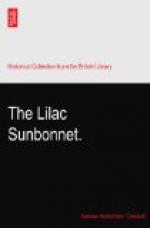It is of such women, born to the full power and passion of sex, and with all the delicate keenness of the feminine brain, utterly without principle or scruple, that the Cleopatras are made. For black-browed Egypt, the serpent of old Nile, can sit in a country byre, and read a letter to another woman. For Cleopatra is not history; she is type.
CHAPTER XXI.
The return of Ebie Farrish.
Now Ebie Farrish had been over at the Nether Crae seeing the lassies there in a friendly way after the scene in the byre, for Galloway ploughmen were the most general of lovers. Ebie considered it therefore no disloyalty to Jess that he would display his watch-guard and other accomplishments to the young maids at the Crae. Nor indeed would Jess herself have so considered it. It was only Meg who was so particular that she did not allow such little practice excursions of this kind on the part of her young men.
When Ebie started to go home, it was just midnight. As he came over the Grannoch bridge he saw the stars reflected in the water, and the long stretches of the loch glimmering pearl grey in the faint starlight and the late twilight. He thought they looked as if they were running down hill. His thoughts and doings that day and night had been earthly enough. He had no regrets and few aspirations. But the coolness of the twilight gave him the sense of being a better man than he knew himself to be. Ebie went to sit under the ministrations of the Reverend Erasmus Teends at twelve by the clock on Sunday. He was a regular attendant. He always was spruce in his Sunday blacks. He placed himself in the hard pews so that he could have a view of his flame for the time being. As he listened to the minister he thought sometimes of her and of his work, and of the turnip-hoeing on the morrow, but oftenest of Jess, who went to the Marrow kirk over the hills. He thought of the rise of ten shillings that he would ask at the next half-year’s term, all as a matter of course—just as Robert Jamieson the large farmer, thought of the rent day and the market ordinary, and bringing home the “muckle greybeard “full of excellent Glenlivat from the Cross Keys on Wednesday. Above them both the Reverend Erasmus Teends droned and drowsed, as Jess Kissock said with her faculty for expression, “bummelin’ awa like a bubbly-Jock or a bum-bee in a bottle.”
But coming home in the coolness of this night, the ploughman was, for the time being, purged of the grosser humours which come naturally to strong, coarse natures, with physical frames ramping with youth and good feeding. He stood long looking into the lane water, which glided beneath the bridge and away down to the Dee without a sound.
He saw where, on the broad bosom of the loch, the stillness lay grey and smooth like glimmering steel, with little puffs of night wind purling across it, and disappearing like breath from a new knife-blade. He saw where the smooth satin plane rippled to the first water-break, as the stream collected itself, deep and black, with the force of the water behind it, to flow beneath the bridge. When Ebie Farrish came to the bridge he was a material Galloway ploughman, satisfied with his night’s conquests and chewing the cud of their memory.




